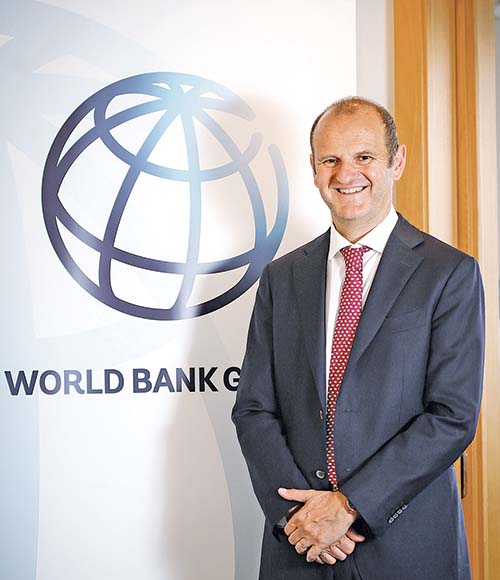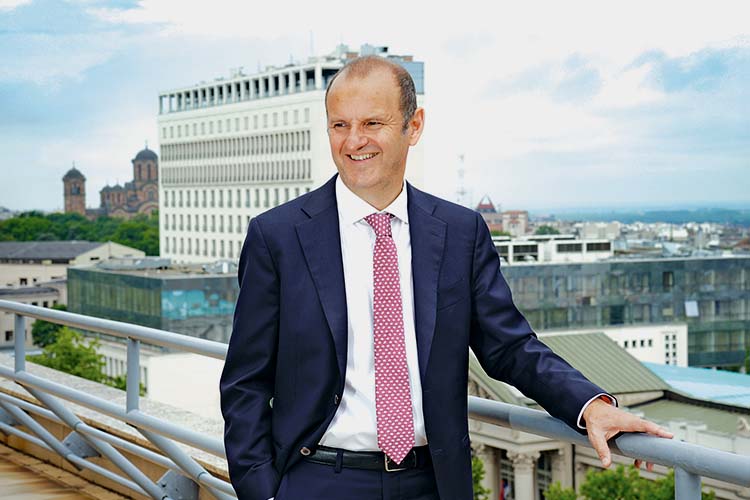It would be critical in the days ahead for the new Serbian government to maintain macroeconomic stability – i.e., to curb inflation and keep the fiscal deficit and public debt under control – while improving the management of state-owned enterprises ~ Nicola Pontara
With the war in Ukraine continuing and the global crisis remaining far from being overcome, experts suggest that Serbia’s robust post-pandemic recovery might be under threat. And this is squarely in the focus of the World Bank in Serbia, which is supporting continuing reforms in several sectors.
What, if anything, is at the disposal of the new government to address this challenge?
The year 2022 has been a challenging one for the world economy. The war in Ukraine, higher food and energy prices and disruptions to international supply chains have caused a major slowdown in global growth. Serbia is no exception: in 2022, the economy is also feeling the repercussions of these phenomena, which have resulted in greater fiscal pressures, rising inflation and slower growth (our GDP growth projection for Serbia is now 3.2%, down from our earlier pre-war projection of 4.5%). It would therefore be critical for the new government to maintain macroeconomic stability – that is, to curb inflation and keep the fiscal deficit and public debt under control – while improving the management of state-owned enterprises (SOEs). The country also faces longer term structural challenges that require action to improve skills and productivity, and to embark decisively on a just and green transition.
Many are pointing out that Serbia was slow to implement internal reforms needed to place state-owned enterprises on a solid financial footing. What is your view of this possible threat to fiscal stability?
The Serbian authorities carried out impressive reforms on the SOEs front in recent years, privatising and restructuring many of them to promote competition. But important sectors remain dominated by prominent SOEs – think about EPS, Telekom Srbija and Srbijagas, which are big enough to constitute a major burden on the budget. Let’s take the energy sector as an example. EPS has incurred some significant losses, starting in 2021, due to unexpected imports of coal and electricity at very high prices, requiring significant subsidies from the state budget. It would be important for the new government to reinvigorate the SOE reform agenda, focusing on strengthening their commercial orientation and corporate governance – not only in the energy sector, but across the economy.
How well has Serbia been maintaining macroeconomic stability, and what do you see as the most prominent downside risks that could materialise by the end of 2022 and in early 2023?
Serbia did well on the macroeconomic front in the years leading up to the pandemic, building fiscal buffers to respond to the impact of COVID-19 and avoid a hard landing. The economy posted a minor recession in 2020, followed by a healthy rebound in 2021, with growth reaching 7.4%. Facing global headwinds, the National Bank of Serbia (NBS) started tightening monetary policy last autumn.
It would be important for the new government to reinvigorate the SOE reform agenda, focusing on strengthening their commercial orientation and corporate governance – not only in the energy sector, but across the economy
Inflation is, by and large, imported via higher international prices and remains a persistent challenge. Despite being a net food exporter, food prices in Serbia have increased faster than in other European countries, suggesting a need to promote competition. Risks that could cloud Serbia’s outlook include further waves of COVID-19 and rising global financing costs: both could exert additional pressure on the state budget, leading to increased public and external debt.
Many interlocutors, including the Foreign Investors Council, point to the need for faster structural reforms to boost productivity, increase competition, invest in human capital and strengthen governance. In which areas has Serbia performed well to date; and where should the Government press the accelerator?
Prior to COVID-19, the Serbian economy was growing at an average rate of around three per cent per year and maintaining macroeconomic stability.

But there are challenges: price competitiveness in lower value-added sectors is eroding; productivity growth is stagnant and the population is ageing fast. Average annual growth of three per cent is not enough for Serbia to close the gap on key comparative countries in the EU. Raising that rate of growth requires reforms and the key ingredients of such a new growth agenda include: (i) boosting quality public and private investment; (ii) coordinating skill-building with the private sector; (iii) raising the productivity of private enterprises; (iv) expanding and greening exports; and (v) unleashing competition through governance reforms. Policies need to adapt to the post-pandemic world, which is all about more resilient, greener and digitalised economies.
By the same token, the independence of public institutions has still not been fully achieved. How do you perceive the lack of progress in this area during such times of pronounced instability?
Digitalisation can play an important role here, in order to make institutions more transparent and accountable; increase the quality and transparency of services to citizens and businesses; and strengthen trust in public institutions. Our Enabling Digital Governance Project supports the digitalisation of feedback mechanisms available to citizens. The ongoing Real Estate Management Project achieved significant improvements in the cadastral register, including the digitisation of property registries. We are also supporting the application of the digital public procurement portal and the TRIGGER process, which identifies specific transparency steps relevant to citizens and businesses that the government is willing to take. So, I wouldn’t say that there hasn’t been progress on this front, but there is certainly room for further improvement.
Since the World Bank discontinued its Doing Business report in 2021, how do you address, for instance, business regulatory costs that are still seen by many domestic and international investors in Serbia as being high and unpredictable?
The government has simplified administrative procedures to start a business and introduced incentives to help innovative companies develop and grow – including tax incentives for company founders, tax credits for R&D and tax breaks for hiring new staff. It is very important to foster a healthy ecosystem for innovation, entrepreneurship, and start-ups – which can be an engine of growth and job creation. We have been supporting this agenda, in partnership with the European Commission, through our Accelerating Innovation and Growth Entrepreneurship Project. The digitalisation of government services is important not only from a standpoint of transparency and trust, but also because it cuts the costs of doing business.
The inclusion agenda is important: it is about giving all children a good start with high-quality and inclusive health and education services, regardless of gender, place of residence or belonging to specific socioeconomic groups, like the Roma
Although some efforts have been made to digitalise government-to-business services, this still only represents a small subset. Increasing the number of available services, focusing on making the most frequent and costly ones easy to use and reliable, could contribute significantly to easing the administrative burden on businesses. Labour shortages across almost all sectors and education profiles represent one of the relatively new threats to growth. What are you doing to support labour market participation in Serbia? This is a complex question. On the one hand, unemployment has more than halved over the last 10 years, falling from above 20 per cent in 2012 to around 10 per cent in 2022. On the other hand, the quality of jobs has declined. Moreover, labour productivity in Serbia is less than half the EU average and no longer aligns with more advanced economies. Action is required on multiple fronts.

In education, the quality of learning needs to improve from early childhood (we are supporting this agenda with our Early Childhood Education and Care Project) through to the tertiary level – ensuring that the skills acquired are relevant to the labour market and high-demand sectors. And let’s not forget the 20 per cent of young adults who are currently neither in education nor the labour market. Training, re-training and lifelong learning programmes can also create better opportunities for job seekers and help improve the labour supply in critical areas where jobs are needed. On the institutional side, well targeted Active Labour Market Programmes that focus on vulnerable groups can support their employability.
More broadly speaking, the Building Human Capital for Long Term Prosperity Report, published by UNICEF Serbia and the World Bank, shows that human development sectors – education, health, and social protection – are essential to boost human capital and support long-term inclusion, wellbeing and productivity growth. What have we lost on that road during COVID-19; and how well prepared are we to return to a positive trajectory in those areas?
The findings of the Serbia Human Capital Review, conducted in collaboration with UNICEF, point to reduced spending on human development and declining productivity. Outcomes in health and education vary depending on gender, socioeconomic group and geographical location. The global pandemic exposed the limits of social protection systems, which weren’t sufficiently flexible to adjust during emergency times. Let me focus on health and social assistance. COVID-19 jeopardised the delivery of preventive and curative care services. Going forward, it will be important to focus on the growing burden of non-communicable diseases and to continue important reforms aimed at improving the quality and effectiveness of healthcare services. Spending on social assistance will need to shift more towards means-tested poverty programmes (like financial social assistance and child allowances). The inclusion agenda is important: it is about giving all children a good start with high-quality and inclusive health and education services, regardless of gender, place of residence or belonging to specific socioeconomic groups, like the Roma.
Residential heating is a major source of air pollution in Serbian cities, and one that’s mainly linked to poor families and communities. The World Bank Board of Directors recently approved a $50 million equivalent loan for the Scaling Up Residential Clean Energy (SURCE) Project. How could this project contribute to a just green transition?
Through its matching grant mechanism, the SURCE Project will contribute to several objectives related to the Just Green Transition: reducing the energy and carbon intensity of the residential sector; improving air quality by incentivising the replacement of solid-fuel fired boilers; and increasing heating comfort levels, especially for lower-income households. It will also yield several additional benefits of green investments, including increased energy security for households, the creation of new jobs retrofitting single-family homes, and enhanced opportunities for private firms to provide services in the energy efficiency market.
| COMPETITION Despite being a net food exporter, food prices in Serbia have increased faster than in other European countries, suggesting a need to promote competition | EMPLOYMENT Unemployment levels have fallen over the last decade, but the quality of jobs has also declined and Serbia’s labour productivity is less than half the EU average. Action on multiple fronts is thus required | RISKS Further waves of COVID-19 infection and rising global financing costs could both place additional pressure on the state budget, leading to increased public and external debt |
|---|